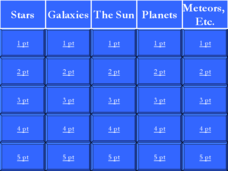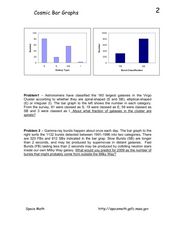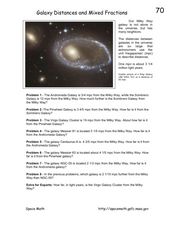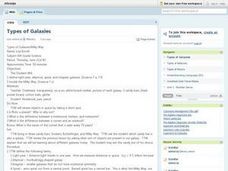Curated OER
Star Light, Star Bright
Four modules are a part of this stellar lesson plan. Space scientists view the electromagnetic spectrum, they generate waves on a computer screen in order to measure frequency and wavelength, discover how light is related to temperature,...
Curated OER
The Solar System and Beyond
Survey the solar system by viewing this PowerPoint. Amateur astronomers discover that gravity is responsible for Earth's orbit around the sun and the moon's orbit around Earth. They explore the moon's phases and Earth's seasons. This...
Curated OER
Astronomy Jeopardy
There are 5-point level questions available for each of the categories in this Jeopardy game. The categories are the main topics within astronomy; stars, galaxies, the sun, planets, meteors etc. The game is logically set up and...
Curated OER
Metallic Galactic Mobile
Students create 3-dimensional models of their own imaginary galaxies of newly discovered planets. They write fictional accounts of their experiences visiting each new planet. Students writing includes a recognizable beginning, middle,...
Curated OER
Galaxies Galore!
Twelve of these slides display a picture of a galaxy and pose the question, "What kind of galaxy is this?" There are two slides about the Hubble Space Telescope's tuning fork, and another that asks viewers to analyze the number of...
Curated OER
Exploring a Galaxy
In this galaxy worksheet, students use the Internet or other resources to answer 13 questions about the galaxy NGC-1232. They are given a photograph of the galaxy to help determine the width and diameter of certain regions of...
Curated OER
Calculating Black Hole Power
In this black hole learning exercise, students use a given equation that relates the rate of matter falling into a black hole to the power emitted by the black hole to determine accreted mass.
Curated OER
Galaxies to Scale
In this scales and galaxies worksheet, students solve 7 problems including finding the size of galaxies in comparison to other galaxies and drawing scale models of the given galaxies to show their relative sizes and shapes.
Curated OER
Counting Galaxies with the Hubble Space Telescope
In this counting galaxies worksheet, students use a photograph taken by the Hubble Space Telescope and they divide the field into 16 square areas. They find the average number of galaxies in the cells, they find the area of one of the...
Curated OER
How Many Quasars Are There?
In this quasars worksheet, students read about how astronomers can detect quasars by their luminosity. Students use a given equation to solve 4 problems including finding quasar magnitude, determining the number of quasars with given...
Curated OER
Cosmic Bar Graphs
For this cosmic bar graph worksheet, students solve 2 problems using given bar graphs that plot the number of galaxies vs. the galaxy type and the number of gamma-ray bursts vs. the burst classification. Students find the fraction of...
Curated OER
Galaxy Distances and Mixed Fractions
For this galaxies and fractions worksheet, students solve 8 problems involving the distances of galaxies from each other by using mixed fractions to solve each problem. They use the megaparsec as the unit of measurement.
Curated OER
The Big Bang-Hubble's Law
In this Hubble's law worksheet, students use data for galaxies which include their distance and speed. Students make a graph to show the distance to each galaxy and the speed of each galaxy. They use their graph to answer 4 questions...
Curated OER
Galaxies and the Expanding Universe
In this galaxies and the universe worksheet, students are given 8 clues about galaxies of the universe, spectrographs, and the theory of the universe expanding. They write the answer to each in given blanks with boxed letters. They...
Curated OER
Galaxies
Tenth graders explore the structure and content of galaxies. Through discussion, lab, and hands-on activities, they discover the general structure of the three types of galaxies as well as the effect they have on the structure and...
Curated OER
The Universe
Students describe what scientists mean by an "expanding universe" in their own words. They explain how scientists comprehend the universie is expanding. Students comprehend the vast scale of the universe. They comprehend how theory...
Curated OER
Astronomy Test
In this astronomy test, students answer 50 true/false and multiple choice questions about the relationships of the earth, moon, and sun. The test also includes questions about the solar system, galaxies, and the universe. An answer key...
Curated OER
Hunting for galaxies in the Hubble Deep Field
Students examine Hubble Deep Field images. In this galaxy classification lesson, students research galaxy classification. Students view and classify Hubble Deep field images of galaxies.
Curated OER
Star Search
Seventh graders explore stars. In this star lesson, 7th graders apply generalities about space objects to constellations and explore the differences between radio waves and light waves by answering essential questions in their research.
Curated OER
Stars and Galaxies
In this space science worksheet, students find the words related to the terms used to describe stars and galaxies. The answers are found through clicking the button at the bottom of the page.
Curated OER
Types of Galaxies
Eighth graders take a quiz to review the different objects in space. As a class, they define terms related to galaxies. In groups, they make a model of the Milky Way galaxy using materials provided to them by their teacher. To end the...
Curated OER
Star Gazers
Students research stars, constellations, planets and galaxies including names, shapes, sizes, colors, patterns and ages. They suspend the stars and planets from the ceiling and change monthy to display the various constellations. As a...
Curated OER
20th-Century Astronomy
Students examine and explain how the distance to nearby stars can be measured by the parallax method, discuss the role of women in the history of American astronomy, form their own opinions of the importance of Harlow Shapley and Edwin...
Curated OER
SkyServer Scanvenger Hunt
Students discover the variety and beauty of objects in the sky and the ability of a research telescope to obtain quantitative information about these objects. They use the SkyServer Navigation Tool to identify objects and record...

























